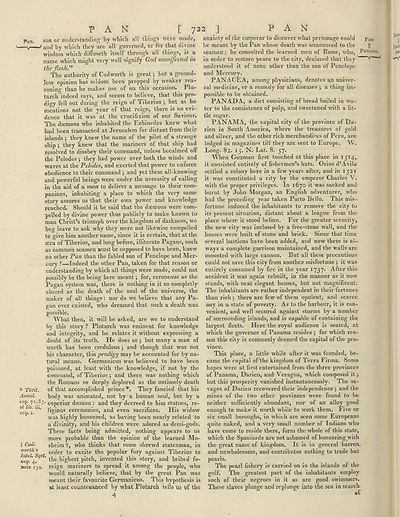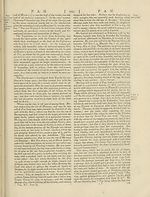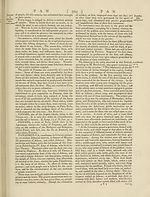Encyclopaedia Britannica > Volume 15, NIC-PAR
(800) Page 722
Download files
Complete book:
Individual page:
Thumbnail gallery: Grid view | List view

PAN [ '722 ] PAN
Pan. son or anderstamUng by which all things were made,
— ' and by which they are all governed, or for that divine
wisdom which dilluseth itsell through all things, is a
name which might very well signily God manifested in
the flesh.^
The authority of Cudworth is great *, but a ground¬
less opinion has seldom been propped by weaker rea¬
soning than he makes use of on this occasion.. Plu¬
tarch indeed says, and seems to believe, that this pro¬
digy fell out during the reign of Tiberius ; but as he
mentions not the year of that reign, there is no evi¬
dence that it was’ at the crucifixion of our Saviour.
The daemons who inhabited the Echinedes knew what
had been transacted at Jerusalem far distant from their
islands $ they knew the name of the pilot of a strange
ship \ they knew that the mariners of that ship had
resolved to disobey their command, unless becalmed oft
the Pelodes j they had power over both the winds and
waves at the Pelodes, and exerted that power to enforce
obedience to their command ; and yet these all-knowing
and powerful beings were under the necessity of calling
in the aid of a man to deliver a message to their com¬
panions, inhabiting a place to which the very same
story assures us that their own power and knowledge
reached. Should it be said that the daemons were com¬
pelled by divine power thus publicly to make known to¬
man Christ’s triumph over the kingdom of darkness, we
beg leave to ask why they were not likewise compelled
to give him another name, since it is certain, that at the
sera of Tiberius, and long before, illiterate Pagans, sueb
as common seamen must be supposed to have been, knew
no other Pan than the fabled son of Penelope and Mer¬
cury ?—Indeed the other Pan, taken for that reason or
understanding by which all things were made, could not
possibly be the being here, meant j for, erroneous as the
Pagan system was, there is nothing in it so completly
absurd as the death of the soul of the universe, the
maker of all things : nor do we believe that any Pa¬
gan ever existed, who dreamed that such a death was
possible.
What then, it will be asked, are we to understand
by this story ? Plutarch was eminent for knowledge
and integrity, and he relates it without expressing a
doubt of its truth. He does so j but many a man of
worth has been credulous j and though that was not
his character, this prodigy may be accounted for by na¬
tural means. Germanicus was believed to have been
poisoned, at least with the knowledge, if not by the
command, of Tiberius j and there was nothing which
the Homans so deeply deplored as the untimely death
-* Tacit. of that accomplished prince*. They fancied that his
Annul. body was animated, not by a human soul, but by a
snPer*or ^0ernon : and they decreed to him statues, re¬
cap i 1U* ligi°us ceremonies, and even sacrifices. His widow
was highly honoured, as having been nearly related to
a divinity, and his children were adored as demi-gods.
These facts being admitted, nothing appears to us
more probable than the opinion of the learned Mo-
} Cud- sheim t, who thinks that some shrewd statesman, in
Intetsi ct or^er excite the popular fury against Tiberius to
«ap 4. ' ' the highest pitch, invented this story, and bribed fo-
aote 13a. reign mariners to spread it among the people, who
would naturally believe, that by the great Pan was
meant their favourite Germanicus. This hypothesis is
at least countenanced by what Plutarch tells u§ of the
4
anxiety of the emperor to discover what personage could pan
be meant by the Pan whose death was announced to the ||
seamen : he consulted the learned men of Rome, who, , Pariitma,
in order to restore peace to the city, declared that they v""~-
understood it of none other than the son of Penelope
and Mercury.
PANACEA, among physicians, denotes an univer¬
sal medicine, or a remedy for all diseases j a thing im¬
possible to be obtained.
PANADA, a diet consisting of bread boiled in wa¬
ter to the consistence of pulp, and sweetened wTith a lit¬
tle sugar.
PANAMA, the capital city of the province of Da¬
rien in South America, where the treasures of gold
and silver, and the other rich merchandises of Peru, are
lodged in magazines till they are sent to Europe. W.
Long. 82. 15. N. Lat. 8. 57.
When Guzman first touched at this place in 1514,
it consisted entirely of fishermen’s huts. Orius d’Avila
settled a colony here in a few years after, and in 1521
it was constituted a city by the emperor Charles V.
with the proper privileges. In 1670 it was sacked and
burnt by John Morgan, an English adventurer, who
had the preceding year taken Porto Bello. This mis¬
fortune induced the inhabitants to remove the city to
its present situation, distant about a league from the
place where k stood before. For the greater security,
the new city was inclosed by a free-stone wall, and the
houses were built of stone and brick. Since that time
several bastions have been added, and now there is al¬
ways a complete garrison maintained, and the walls are
mounted with large cannon. But all these precautions
could not save this city from another misfortune 5 it was
entirely consumed by fire in the year 1737* After this-
accident it was again rebuilt, in the manner as it now
stands, with neat elegant houses, but not magnificent.
The inhabitants are rather independent in their fortunes'
than rich ; there are few of them opulent, and scarce
any in a state of poverty. As to the harbour, it is con¬
venient, and well secured against storms by a number
of surrounding islands, and is capable of containing the
largest fleets. Here the royal audience is seated, at
which the governor of Panama resides j for which rea¬
son this city is commonly deemed the capital of the pro¬
vince.
This place, a little while after it was founded, be¬
came the capital of the kingdom of Terra Firma. Some
hopes were at first entertained from the three provinces
of Panama, Darien, and Veragua, which composed it y
but this prosperity vanished instantaneously. The sa¬
vages of Darien recovered their independence ; and the
mines of the two other provinces were found to be
neither sufficiently abundant, nor of an alloy good
enough to make it worth while to work them. Five or
six small boroughs, in which are seen some Europeans
quite naked, and a very small number of Indians who
have come to reside there, form the whole of this state,
which the Spaniards are not ashamed of honouring with
the great name of kingdom. It is in general barren,
and unwholesome, and contributes nothing to trade but
pearls.
The pearl fishery is carried on in the islands of the
gulf. The greatest part of the inhabitants employ
such of their negroes in it as are good swimmers.
These slaves plunge and replunge into the sea in search
ef
II
final
iffii
u-Y
Pan. son or anderstamUng by which all things were made,
— ' and by which they are all governed, or for that divine
wisdom which dilluseth itsell through all things, is a
name which might very well signily God manifested in
the flesh.^
The authority of Cudworth is great *, but a ground¬
less opinion has seldom been propped by weaker rea¬
soning than he makes use of on this occasion.. Plu¬
tarch indeed says, and seems to believe, that this pro¬
digy fell out during the reign of Tiberius ; but as he
mentions not the year of that reign, there is no evi¬
dence that it was’ at the crucifixion of our Saviour.
The daemons who inhabited the Echinedes knew what
had been transacted at Jerusalem far distant from their
islands $ they knew the name of the pilot of a strange
ship \ they knew that the mariners of that ship had
resolved to disobey their command, unless becalmed oft
the Pelodes j they had power over both the winds and
waves at the Pelodes, and exerted that power to enforce
obedience to their command ; and yet these all-knowing
and powerful beings were under the necessity of calling
in the aid of a man to deliver a message to their com¬
panions, inhabiting a place to which the very same
story assures us that their own power and knowledge
reached. Should it be said that the daemons were com¬
pelled by divine power thus publicly to make known to¬
man Christ’s triumph over the kingdom of darkness, we
beg leave to ask why they were not likewise compelled
to give him another name, since it is certain, that at the
sera of Tiberius, and long before, illiterate Pagans, sueb
as common seamen must be supposed to have been, knew
no other Pan than the fabled son of Penelope and Mer¬
cury ?—Indeed the other Pan, taken for that reason or
understanding by which all things were made, could not
possibly be the being here, meant j for, erroneous as the
Pagan system was, there is nothing in it so completly
absurd as the death of the soul of the universe, the
maker of all things : nor do we believe that any Pa¬
gan ever existed, who dreamed that such a death was
possible.
What then, it will be asked, are we to understand
by this story ? Plutarch was eminent for knowledge
and integrity, and he relates it without expressing a
doubt of its truth. He does so j but many a man of
worth has been credulous j and though that was not
his character, this prodigy may be accounted for by na¬
tural means. Germanicus was believed to have been
poisoned, at least with the knowledge, if not by the
command, of Tiberius j and there was nothing which
the Homans so deeply deplored as the untimely death
-* Tacit. of that accomplished prince*. They fancied that his
Annul. body was animated, not by a human soul, but by a
snPer*or ^0ernon : and they decreed to him statues, re¬
cap i 1U* ligi°us ceremonies, and even sacrifices. His widow
was highly honoured, as having been nearly related to
a divinity, and his children were adored as demi-gods.
These facts being admitted, nothing appears to us
more probable than the opinion of the learned Mo-
} Cud- sheim t, who thinks that some shrewd statesman, in
Intetsi ct or^er excite the popular fury against Tiberius to
«ap 4. ' ' the highest pitch, invented this story, and bribed fo-
aote 13a. reign mariners to spread it among the people, who
would naturally believe, that by the great Pan was
meant their favourite Germanicus. This hypothesis is
at least countenanced by what Plutarch tells u§ of the
4
anxiety of the emperor to discover what personage could pan
be meant by the Pan whose death was announced to the ||
seamen : he consulted the learned men of Rome, who, , Pariitma,
in order to restore peace to the city, declared that they v""~-
understood it of none other than the son of Penelope
and Mercury.
PANACEA, among physicians, denotes an univer¬
sal medicine, or a remedy for all diseases j a thing im¬
possible to be obtained.
PANADA, a diet consisting of bread boiled in wa¬
ter to the consistence of pulp, and sweetened wTith a lit¬
tle sugar.
PANAMA, the capital city of the province of Da¬
rien in South America, where the treasures of gold
and silver, and the other rich merchandises of Peru, are
lodged in magazines till they are sent to Europe. W.
Long. 82. 15. N. Lat. 8. 57.
When Guzman first touched at this place in 1514,
it consisted entirely of fishermen’s huts. Orius d’Avila
settled a colony here in a few years after, and in 1521
it was constituted a city by the emperor Charles V.
with the proper privileges. In 1670 it was sacked and
burnt by John Morgan, an English adventurer, who
had the preceding year taken Porto Bello. This mis¬
fortune induced the inhabitants to remove the city to
its present situation, distant about a league from the
place where k stood before. For the greater security,
the new city was inclosed by a free-stone wall, and the
houses were built of stone and brick. Since that time
several bastions have been added, and now there is al¬
ways a complete garrison maintained, and the walls are
mounted with large cannon. But all these precautions
could not save this city from another misfortune 5 it was
entirely consumed by fire in the year 1737* After this-
accident it was again rebuilt, in the manner as it now
stands, with neat elegant houses, but not magnificent.
The inhabitants are rather independent in their fortunes'
than rich ; there are few of them opulent, and scarce
any in a state of poverty. As to the harbour, it is con¬
venient, and well secured against storms by a number
of surrounding islands, and is capable of containing the
largest fleets. Here the royal audience is seated, at
which the governor of Panama resides j for which rea¬
son this city is commonly deemed the capital of the pro¬
vince.
This place, a little while after it was founded, be¬
came the capital of the kingdom of Terra Firma. Some
hopes were at first entertained from the three provinces
of Panama, Darien, and Veragua, which composed it y
but this prosperity vanished instantaneously. The sa¬
vages of Darien recovered their independence ; and the
mines of the two other provinces were found to be
neither sufficiently abundant, nor of an alloy good
enough to make it worth while to work them. Five or
six small boroughs, in which are seen some Europeans
quite naked, and a very small number of Indians who
have come to reside there, form the whole of this state,
which the Spaniards are not ashamed of honouring with
the great name of kingdom. It is in general barren,
and unwholesome, and contributes nothing to trade but
pearls.
The pearl fishery is carried on in the islands of the
gulf. The greatest part of the inhabitants employ
such of their negroes in it as are good swimmers.
These slaves plunge and replunge into the sea in search
ef
II
final
iffii
u-Y
Set display mode to:
![]() Universal Viewer |
Universal Viewer | ![]() Mirador |
Large image | Transcription
Mirador |
Large image | Transcription
Images and transcriptions on this page, including medium image downloads, may be used under the Creative Commons Attribution 4.0 International Licence unless otherwise stated. ![]()
| Encyclopaedia Britannica > Encyclopaedia Britannica > Volume 15, NIC-PAR > (800) Page 722 |
|---|
| Permanent URL | https://digital.nls.uk/192592098 |
|---|
| Attribution and copyright: |
|
|---|
| Shelfmark | EB.11 |
|---|---|
| Description | Ten editions of 'Encyclopaedia Britannica', issued from 1768-1903, in 231 volumes. Originally issued in 100 weekly parts (3 volumes) between 1768 and 1771 by publishers: Colin Macfarquhar and Andrew Bell (Edinburgh); editor: William Smellie: engraver: Andrew Bell. Expanded editions in the 19th century featured more volumes and contributions from leading experts in their fields. Managed and published in Edinburgh up to the 9th edition (25 volumes, from 1875-1889); the 10th edition (1902-1903) re-issued the 9th edition, with 11 supplementary volumes. |
|---|---|
| Additional NLS resources: |
|

